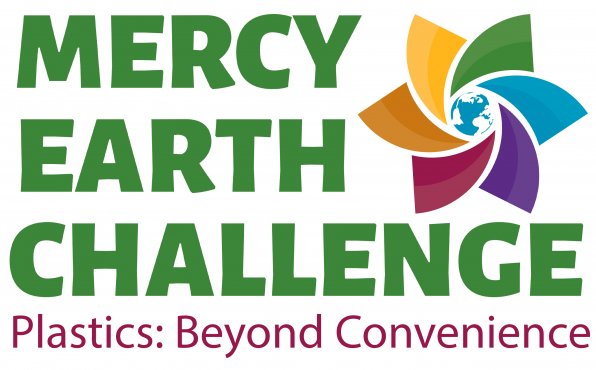By Sister Karen Donahue
Plastic is literally everywhere. It is a major component of just about everything we encounter in daily life, including computers, cell phones, home appliances, household items, food packaging, personal care products and much more.

As we move into the next module of our Mercy Earth Challenge, we will be focusing on plastic. Plastic usage has emerged as a concern for several reasons:
- Plastics do not degrade easily, which means that they will be around for a long time. It is estimated that a plastic water bottle will take 450 years to decompose.
- The wide use of plastics, especially in packaging and for items intended for single use and then discarded, means that landfills are rapidly filling up with plastic that will take centuries to degrade.
- Plastic waste is also littering our rivers, streams, beaches and even the oceans, where it threatens sea life. The Great Pacific Garbage Patch, which was discovered in 1997 and is estimated to be the size of the state of Texas (261,000 square miles), contains a huge amount of plastic waste
- Plastic is closely tied to the fossil fuel industry—coal, petroleum and especially natural gas provide the chemical building blocks needed to produce plastic. Fracking, which produces large amounts of cheap ethane, a major component of many plastics, has been a boon to the plastics industry.
We invite you to access our January plastics calendar, which includes daily tips or inspiration for taking action.
You also may register to receive weekly emails with information on various aspects of the plastics problem:
Week one will focus on the origins of plastic, how it is produced, its ties to fracking and the push for expanded plastics production, including seeking new markets for single-use plastic in poorer countries.
Week two will examine the pollution issues surrounding the extraction of fossil fuels, including the impact of pipelines, plastics production, plastic in rivers, oceans and other waterways and plastics incineration.
Week three will explore the myth of plastic recycling. In 2017, China announced that it would no longer accept solid waste, much of which was material intended for recycling. This move on the part of China has put a damper on global recycling efforts.
Week four will look at solutions, including zero-waste programs, bans on single-use plastics, biodegradable products that are truly biodegradable, making plastics manufacturers responsible for post-consumer disposal, reusable packaging, localized production systems and an end to fossil fuel subsidies.
At the end of the month, we will call for a commitment to make personal lifestyle changes as well as advocacy efforts in support of policies to reduce plastic usage and waste.